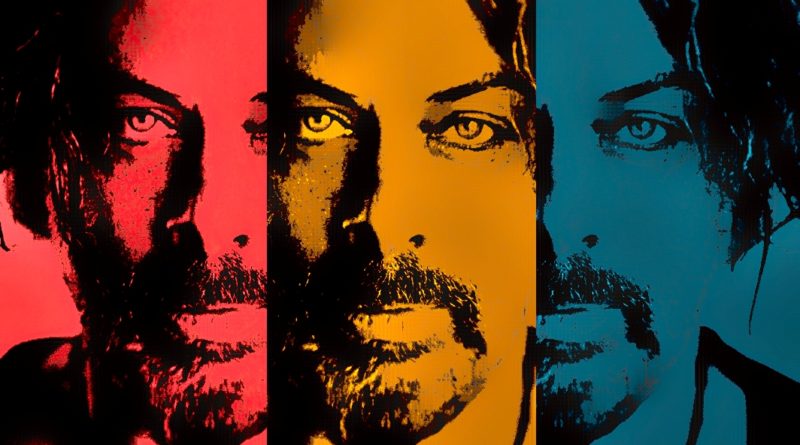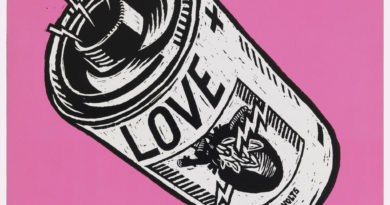Richie Kotzen: An American Journeyman at Mid-Century
The legendary guitar wiz celebrates his 50th birthday with a 50-song album

Most people on their birthday usually just want to have a nice dinner and/or get drunk.
However, former Poison and Mr. Big guitarist and current Winery Dogs frontman Richie Kotzen chose to celebrate his 50th birthday (Feb. 3) by releasing a massive 3CD/50-song solo album entitled 50 for 50.
The triple album is Kotzen’s 22nd solo affair since recording his debut album at the age of 19. On 50 for 50, the multi-talented, multi-instrumentalist Kotzen performed every instrument, sang lead vocals, self-produced and recorded it in his home studio and released it through his own record label (Headroom, Inc.)
On its 50 tracks, Kotzen’s vast and diverse influences run the musical gamut of genres such as rock, hard rock, pop, blues, soul, R&B, funk and jazz fusion.
Kotzen recently spoke to Rock and Roll Globe about the impetus for the new album, his tenure in Poison and the current status of the Winery Dogs.
How did 50 for 50 come about?
It came out of just me looking at a bunch of ideas that I had not finished and wondering, ‘Why didn’t I bother to finish this stuff?’ I had written and recorded 12 songs that would have been a normal record. Then I was looking around on my computer and I discovered there were five other songs that I’d been sitting on for a very long time that were finished. When I added it all up, I had just shy of 20 songs ready to go.
Then I started going through the archives and I was finding all these really cool ideas, some that were half finished, some that were in the infantile stages. I just decided to see how many of these I can finish, so I started going through these ideas, finishing them up. And then in the process, I started coming up with brand new ideas. Before I knew it, a couple of months went by and I had well over 30 songs completed. Then I had the idea that if I could get to 50 and stop when I hit 50, it would be kind of cool to release the 50-song album on my 50th birthday because I only turn 50 once.
Did you at one point ever feel like you may have bitten off more than you could chew, so to speak?
Well, I’ll tell you what I did, I kept this very much a personal project. I think I mentioned it to two or three people, and one of them was my tour manager. I said, ‘I was thinking about doing a 50-song album, but I don’t know if I can pull it off.’ So I didn’t tell anybody really publicly until I knew that I was going to hit my mark. Then once I knew, when the beginning of October rolled around, and I was maybe 12 songs shy of my goal, I figured well I think I’m going to be able to do this. Then I started talking about it.
The thing is, I’m not wrapped up with any kind of investors or record labels or anything. So if I didn’t get to 50, then no one would have known I was trying to do it, and instead it was almost impossible for me to fail at it because I wasn’t boasting about it to begin with. It was just like an inside game. If I can get there, great, I’ll announce it. If I can’t do it, no one will ever know about it.
So there wasn’t a standard deadline?
Right. In order to pull off the whole concept… Yes, I would have to have a February 3rd release. But somewhere along the line, I knew that I was going to make my deadline, despite the pace of which I was working. And then that’s when I announced it. So if I had not gotten there, I just would have abandoned the whole idea and never told anyone. I kind of kept it under my belt until the last minute.
How did you figure out the sequencing across all three discs?
There are songs on disc one that are only a month or two old, they’re brand new. For example, the song “Innocuous” just came to me while I was finishing some of the other stuff. So it’s not sequenced that way. The first disc has songs that are brand new songs that weren’t completed a while ago and songs that were found during the process.
I would say specifically some of the songs that would have been on the record, had I not reached 50 songs, would have been songs like “Stick the Knife,” “Devil’s Hand,” “Dogs,” “Dirty Tricks,” “Nickel Hustler. Those songs would have been on the next record regardless. The thing about it is, sequencing it was really one of the hardest things I’ve ever done as far as a record is concerned because I had to figure out the math of what songs were going to fit because I knew three discs would make it happen. But with disc 1, I had like 10 minutes of dead space and then I couldn’t fit everything on the other discs then I did it again, then I was over by 10 minutes. It was kind of tricky, but then it kind of fell into place at the end. Thankfully I was able to figure it out.
VIDEO: Richie Kotzen “Devil’s Hand”
Since you recorded the album in your own studio and self-produced it, how did the recording process go?
My writing process for many years has been just that; me going into the studio with an idea and coming out with a finished master, and it’s just something that’s evolved over the years. I think it started when I was very young. Where I lived, it wasn’t so easy to necessarily call people to come over and jam. Although I did have a band and I had friends, we did jam. I found myself a lot of times alone with all these ideas and I started to thinking, ‘I want to bring these to life, how am I going to do that?’ So, I bought a little eight track recorder and a drum set and I started making these crude recordings where I jump on the drums and play a full beat and then start overdubbing.
I found it very inspiring and it evolved into how I do it now. So, in today’s time, I have a studio in my home and I have my drums in the tracking room. They’re all set up there and they always stay miked. So that signal path never changes. And so anytime I have an idea, I can run down, hop on the drums and play my idea. And then if I go back and overdub that to bass guitar or what have you, let’s say a week from now I decide I don’t like the drum fill in the second part, you can go back and drop it in and change it. So that’s kind of how it works. I call it the kind of a round robin approach to recording where everything’s miked at all times and I can jump on any instrument at any time and make my music come to life.
How did you go about constructing the songs?
They are all different. Some songs on the record start off as just a bass line. Other songs just started with a melody line. Some start with a guitar riff, some of them are a lyric idea. They all come from different places. But I’ll give you a great example. One of the newer songs on the record, a song called “Black Mark.” I just came up with that idea and I ran down to the studio, set up a click track just behind the drums and I played and recorded drums to the click track and then by-and-by, I was hearing the band, I was hearing the bass, I was hearing what the guitar part would be and the vocals. And I was really imagining myself playing with the other instrumentations.
So, I recorded the drums and then I went into the control room and started overdubbing different parts. And that’s how that happened. So the song really was in my head, the melody and everything. But to get it going, I started with the drums and the click track and I did not even bother to put a guide guitar. I said I’m just going to go for this. And what you hear on the record was my first take on the drums recording that song.
At three-plus hours in duration, were you concerned about people’s attention spans?
That was the only thing that concerned myself. I did not take into consideration holding anyone’s interest or this or that, because everyone’s different. You can’t really go down that rabbit hole. But what I did do was I made sure that any song I put on the record was something that I liked and that I thought was worthy of sharing with people that care about what it is that I do. So that was my only criteria in the end.
The album was released on your own record label, Headroom, Inc. What are the pros and cons of owning your own label and releasing your own albums?
The best thing about it is that I’m not beholden to anyone. The way it used to be it that in order for you to even be heard, you needed to be signed to a label. Be it an independent or a major, you needed a record label because that’s how you’re usually distributed. And many years ago, everything changed where the artist is able to now get their music directly in the hands of those people who are interested in listening to it. Now the beauty in that as the artists have full creative control to really do whatever it is that you want. Now that might not be ideal for every artist. But for someone like myself that’s been making records since 1989 and I’ve been on the indie label, I’ve been on the major label, I’ve kind of run the gamut.
For me, it’s a great situation to be able to make a record, not have to answer to anyone and just get it out there. Now the only tricky thing for someone that is not in a position like myself, that does not have an existing fan base, then you have to figure out how do you get people to know the record exists. Now that’s something that I don’t really know how to tell you because I’m in a different situation because I’ve already released 20 albums to people who know about me. But the trick is, I would imagine for a new artist that has their own label, is figuring out how to get people to know that they exist.
Poison’s 1993 Native Tongue was just such a great album and you had such a huge impact on the band in the best way possible. What do you remember most about or like most about the only Poison album you played on
First of all, I will say, and I’ve said it many times… I really think we made a great record, and the record actually performed quite well considering what all those bands were going through at that time. MTV was basically telling everyone don’t listen to these bands, they’re not cool anymore, here’s what you should be listening to. And in the meantime, the album performed very well considering what was happening during the climate. But artistically, I think it was a really interesting album.
We actually didn’t really concern ourselves with anything other than our ideas with our songs. We weren’t thinking about the typical having a hit or that sort of thing. We just wanted to do something creative. And I think it was really a fun record. Sheila E. was on that record. Billy Powell was on that record. We had the South Central AME choir singing on the record. We really did some things on that album that the band had never done before. And I’m proud of that. I think it was a strong album.
AUDIO: Poison Native Tongue (full album)
Did you ever feel that you weren’t accepted from the band’s hardcore fan base taking over from C.C. DeVille?
I never felt that. I never get that heady about anything. In other words, if I’m working with someone, there’s a reason why we’re working together. And you want to talk about pressure? If I thought that way… I was in the band with Stanley Clarke years after Poison, and the guitar player that was there before me was Allan Holdsworth. And so if I want to get caught up in that kind of train of thought, I could have really screwed myself up. So, I don’t really get involved in that sort of thought process.
All I care about is are we making music that we believe in and is it worth sharing? And then from there, you can’t worry about someone else’s comments or if somebody doesn’t like your hairstyle. Everybody’s got something to say, good or bad. So, you let them say what they’re going to say and just hope that you are being represented at your best.
What’s the latest news on the Winery Dogs?
The Winery Dogs did a tour last year in May. We did a North American tour. We spent a month on the road and we can chock it up to kind of hang out together and have some fun, and play without the pressure of making a record and the shows went very well. We all walked away feeling pretty good about playing together, but we also acknowledge that we have other things that we’re doing. They have another band, Billy (Sheehan) and Mike (Portnoy) have a band together that’s touring and making records. I have my solo career.
But it’s completely reasonable to assume at some point, I would say in future, it’s very likely that we would get together and start writing. Once again, once we have music worth sharing, we’ll talk about the timing to release the record. I like the idea of writing songs first and then scheduling the time to release the record as opposed to the other way of doing it where you say, ‘yes, we’re putting a record out in February’ and now suddenly we have to hope that we have songs for it. I think it’s much better in this time to get together, write some songs, and then once we know we’ve got some really cool things, then we can schedule a release.
Are there any new endeavors or accomplishments or achievements you want to pursue, including solo dates?
We’re going out on tour. I believe the first run of dates starts in the Northeast and we’re going to go all through the United States probably and on the West Coast since we’re starting on the East. And then from there, I’m going to do a European tour. I think the first show is August 30th or 31st, and then we’re going to stay in Europe through September and so we can fit in as many shows as we can in that time frame. And from there we’ll see. I don’t think too far in advance, but I do know that there’s plenty of tour dates we’re going to set up.
AUDIO: Richie Kotzen 50 for 50 (full album)




